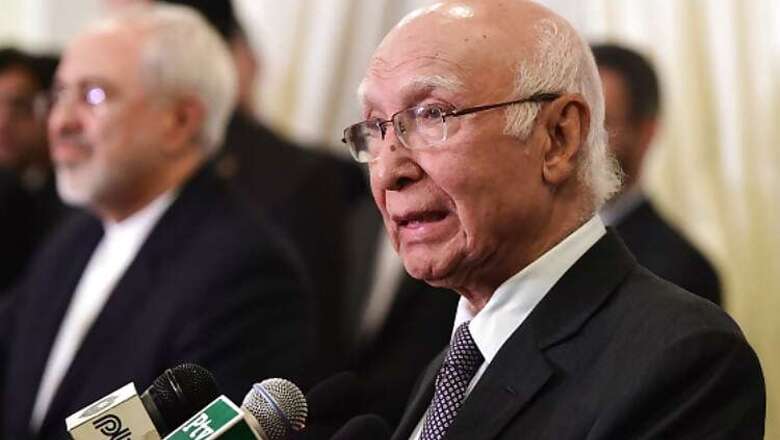
views
Washington: Madrasas along the Afghanistan-Pakistan border and tribal areas, in particular North Waziristan, had become a hub of terrorist activities, Pakistan's top diplomat has said, but blamed it on the Afghan refugees, who entered the country when the US pushed the Taliban out of power after the 9/11.
These madrasas had well-oiled terror infrastructure, beyond imagination, running bomb-making factories, terrorists training centers and those to train suicide bombers - all under multi-storied basement under the mosque, Pakistan Prime Minister's Advisor on Foreign Affairs Sartaj Aziz said.
"In one mosque that I visited, I remember, in Miranshah, from outside we did not see anything. But under the mosque there were a 70-room basement, three stories, in which there were four-five IED factories, four-five suicide training centers, communication network, VIP room, conference rooms, amazing infrastructure," he said, giving details of the how deep rooted terror infrastructure had developed in Pakistan.
In North Waziristan, where the Pakistan Army had launched operation Zarb-e-Azb in June 2014, Aziz estimated there were 30-40 such mosques with similar kind of infrastructure.
Pakistan's tribal areas along the Afghanistan-Pakistan border has seven agencies and North Waziristan is one of them.
Aziz, who was here to attend the 6th US-Pakistan Strategic Dialogue, said this while giving details of the steps being taken by the Pakistani army against terrorists.
"According to our estimates, the IED factories in this particular agency if they had gone their way without disruption, they had enough IEDs for next 20 years for the scale of attacks that they were doing. Those have ended now. Communication infrastructure has been disrupted," Aziz said.
He, however, blamed the Afghan refugees for the tribal areas of Pakistan becoming a hub of terrorism.
"We inherited this problem of (terrorism), 9/11 onwards when people were pushed into our side of the border and they became a threat to us, because they lost their hold in their part of the world. Our tribal belt between Pakistan and Afghanistan is a very long belt and a very open territory. So they came and established themselves," he said.
"Initially they came to seek refuge, but they soon realised that unless they controlled territory and resources they can't survive there. So they started expanding their activities and by 2007-08, they had covered most of the tribal areas. They killed the tribal leaders, then they stared establishing their communication networks, IED factories, suicide training centers," he noted.
"It was unbelievable how quickly they expanded and trained themselves in the tribal belt. So we started getting large scale attacks in our cities, suicide attacks and bomb blasts," Aziz said, adding that in these 14 years, Pakistan lost about 60,000 people, including 10,000 security personnel.
He estimated the economic losses beyond $100 billion.
The toughest area infested with the terrorist was the North West Frontier Province, he said.
Out of seven agencies that the security forces have cleared, those groups, which could not survive there migrated or shifted their activities to North Waziristan.



















Comments
0 comment